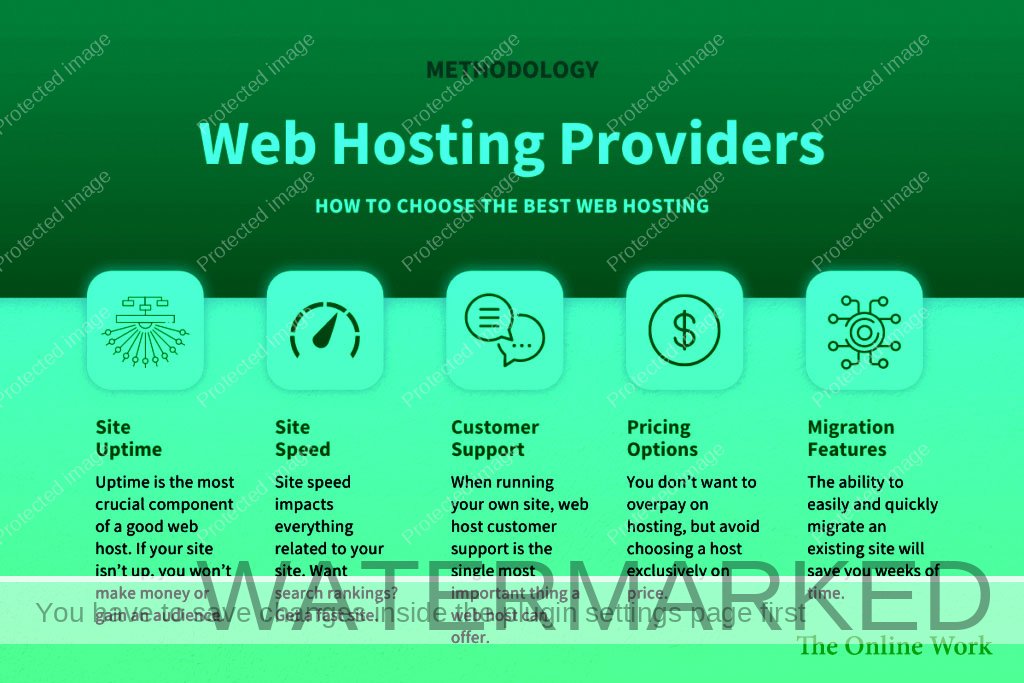Top 8 Best Web Hosting Companies in 2025 | Compare Hosting Check out and read here the Best Web Hosting Companies in the market:
Whether you’re starting your first website or running an expanding company, this guide explains the best web hosting provider options for you based on your needs. You’ll learn which hosts function best in various conditions and how to pick the best one for your purposes.
Selecting the incorrect web host can result in lost income, slow site speed, and downtime, in addition to being annoying. While a poor host can covertly undermine your success, a good one keeps your website up and running quickly and securely.
For me, the most important thing is that the host doesn’t cause headaches. I want a straightforward, uncluttered interface so I can quickly set up my website and never have to worry about hosting again, unless I want to. A good host runs your website without interruption and only intervenes when you need help.
Price is important, too. Budget is usually a major concern, especially for new initiatives, according to the hundreds of website owners I’ve spoken with. For this reason, this advice focuses on solutions that offer good performance without breaking the bank. Paying too much for features you won’t utilize right away is unnecessary.
The companies listed below provide everything you need to start online and remain there successfully, whether you’re creating your first website or adding another to your portfolio.

The Top 8 Best Web Hosts for 2025
- Hostinger: Overall, the best hosting provider
- DreamHost: offers shared hosting at the best price.
- SiteGround: suitable for increased performance and security.
- Bluehost: the best option for new WordPress websites.
- Scala Hosting: The greatest alternative to shared hosting.
- HostGator: The best for basic websites.
- WP Engine: The best managed WordPress hosting.
- IONOS: Hosting Provider, eCommerce solutions, Reliable hosting.
Launching and maintaining a website is made simple by the dependable and comprehensive services provided by all the aforementioned providers.
Do you want further specifics? Let’s examine the qualities that make each of these web hosts a great option in 2025.
Hostinger: Overall Best for Web Hosting

Hostinger provides the best-performing web hosting at one of the most affordable entry-level costs available. Shared hosting plans available a free SSL, ten thousand monthly visitors as a backup for every week. These features are more than sufficient for the majority of new websites, which start at @$1.99/month.
With Hostinger’s free backup services, you may feel secure without having to pay more. Many other hosts charge extra for these services.
The $2.99/month Premium Shared Hosting plan is the most widely used choice. It allows you to host up to 100 websites, manage up to 25,000 monthly visitors, and receive 1 free domain name for one year. It also comes with an SSL certificate and 100 GB of SSD storage.
Upgrading to one of Hostinger’s VPS or cloud plans, which scale smoothly as your traffic increases, is simple if you require additional performance or storage.
Hostinger is one of the most user-friendly control panels available. Its icons are simple to use, and it is neat, contemporary, and well-structured. Setting up WordPress (or any CMS) is as simple as clicking a button thanks to an integrated auto-installer.
Additionally, a separate WordPress dashboard has been introduced to hPanel, a single location to manage plugins, updates, and maintenance mode. You may even access your WordPress admin from the Hostinger panel with just one click.
You’re in capable hands in terms of performance. WordPress LiteSpeed Cache (LSCWP), which uses server-level optimization and caching to greatly increase speed, is preinstalled on every WordPress installation.
Hostinger supports everything with a 99.9% uptime guarantee and round-the-clock live chat customer service that, according to our tests, is quick and responsive.
Do you want a more thorough explanation? Go here to read our complete review of Hostinger.
DreamHost: Best Value Web Hosting

More than 1.5 million websites are powered by DreamHost, which is renowned for providing affordable, transparent, and manageable hosting, particularly for novices. They offer excellent policies, prices, and quickness all in one convenient bundle.
Few hosts have a 100% uptime guarantee, but DreamHost stands behind its service and will credit your account if they don’t meet that promise. They also have one of the longest money-back guarantees on the market, which lasts for 97 days.
You receive free daily backups and unlimited traffic even on their budget plans. That is uncommon; the majority of inexpensive hosts either restrict bandwidth or impose additional fees for backup programs.
DreamHost offers a free domain and WHOIS protection to further protect your privacy. This is a default feature here; however, many other hosts charge more for it.
They are among the only three hosting companies that WordPress.org has officially recommended. One-click installs WordPress, and all plans have a built-in free site migration and WordPress website builder, automatic upgrades.
Therefore, you can quickly get up and running—and easily make adjustments without touching a word of code—even if you have never developed a website before.
The Shared Hosting Starter plan is at just $2.59 per month. For small websites, portfolios, blogs, and charitable organizations seeking dependable, hassle-free hosting, this is among the finest value solutions.
Every plan and feature is covered in greater detail in our complete DreamHost review.
DreamHost’s internal team is in charge of support. Even if phone support is an optional feature for shared hosting, you still have access to live chat and email tickets for round-the-clock assistance, and the knowledge base is well-structured.
For dependable, affordable, low-maintenance hosting, sign up with DreamHost right now.
SiteGround: The Best for Extra Speed and Security

One of the safest and fastest web hosting providers out there, especially for WordPress users, is SiteGround. Now is a great time to sign up because they are giving up to 80% off annual plans that include free site migration.
Because its infrastructure is based on Google Cloud, SiteGround offers lightning-fast performance, incredibly dependable SSD storage, and worldwide accessibility. Everything is set up to load pages quickly and with little latency.
SiteGround takes care of backend security and speed optimization, so you don’t need to worry about either. They start operating in the background to maintain the speed and security of your WordPress website as soon as you open it.
Another noteworthy aspect is security. The security mechanism driven by artificial intelligence at SiteGround stops between 500,000 and 2 million brute-force attacks every hour. In addition, they carry out server health checks at intervals of 0.5 seconds in order to detect and address issues before they escalate into more serious issues.
SiteGround is a WordPress-recommended server that also offers extra security for WordPress websites, such as daily backups, automated plugin and core upgrades, and a smart firewall that is tailored for WordPress vulnerabilities.
All plans come with an intuitive control panel, SiteGround’s WP Starter tool, and one-click WordPress installations. Without requiring additional plugins, you receive built-in caching, staging tools, and auto-updates.
Current annual pricing for new customers at SiteGround is as follows:
- StartUp: ideal for beginners with a single website, starting at $2.99 per month
- GrowBig: $4.99/month – permits an endless number of sites with extra resources
- GoGeek: $7.99 a month for advanced tools like staging and Git
SiteGround provides renewal savings for longer contracts; however, plans renew at higher rates after the first term. Long-term savings are excellent because two-year periods receive 20% off the renewal price, and three-year terms receive 30% off.
To sum up, SiteGround is a high-end choice that is worth the money if security and performance are important to you. WordPress users and expanding websites particularly benefit from these advantages.
Do you want further information? See our comprehensive evaluation of SiteGround.
Bluehost: Best for New WordPress Websites

In 2025, Bluehost is still among the most user-friendly hosting companies, particularly for WordPress websites. It regularly ranks among the simplest hosts to get started with and is officially recommended by WordPress.org.
Bluehost guides you through every step of the process from the time you sign up, including establishing your email and SSL certificate and setting up your blog or online business. For new users who seek a seamless experience free from technological glitches, it’s perfect.
Customer service is available by phone and live chat around the clock in case you have any issues. Help is always only a click away, thanks to the quick links to support that are located on each page of your dashboard.
WordPress can be installed with a single click, and adding eCommerce tools, SEO plugins, CRMs, and other features is simple and requires little work thanks to the Bluehost app marketplace.
The marketing and analytics capabilities that Bluehost offers are what make it unique. Additionally, you’ll receive integrated SEO tools that track your keyword ranks and optimize your website for search engines, making it ideal for novices looking to boost traffic fast.
New clients can acquire Bluehost’s Basic shared hosting plan for as little as $4.75 per month if they make a commitment to the service for three years, despite the fact that the plan regularly costs $9.99 per month. It’s a fantastic method to guarantee reasonable prices while obtaining all the necessary components for your initial website.
After the promotional period is over, Bluehost, like many other hosting providers, hikes hike pricing. For this reason, if funds permit, we advise selecting a longer term up front, as it keeps monthly expenses low and prevents unexpected renewal hikes.
If your website starts to grow, Bluehost will take care of you. Without switching to a different provider, you can upgrade to dedicated servers, VPS, or managed WordPress hosting.
Although Bluehost is compatible with WordPress, it may also be used with other content management systems. Just be advised that anything that is not WordPress may need additional backend maintenance or setup.
Bluehost offers a 30-day money-back guarantee, so you may test them out without risk.
See our thorough Bluehost hosting review for additional information.
Scala Hosting: The Best Upgrade in Shared Hosting

Scala Hosting is one of the greatest methods to advance without going over budget if your website has outgrown shared hosting or if you know you need more control and speed right away.
Although Scala provides shared hosting with a monthly starting price of $2.95, their Entry Cloud plan is the most notable. It is the perfect starting point for cloud hosting because it offers a shockingly low price along with dedicated server capacity.
Two gigabytes of RAM are provided by Scala Hosting, and using Entry Cloud guarantees two CPU cores. These resources aren’t shared with other users, so you won’t ever have to worry about your site being slowed down by noisy neighbors.
Additionally, 50 GB of NVMe SSD storage—much quicker than conventional SSDs—will be provided. Do you need additional room? You can add more storage at any time for a small one-time fee, ranging from 10 GB to 2 TB.
A year of free domain registration, daily backups, SSL certificates, and a full range of premium features, such as the following, are also included in each plan:
- 24/7 S Shield malware prevention around the clock
- Caching using OpenLiteSpeed for quicker page loading
- A dedicated IP address
- Scala’s top priority is assistance
- For further security, use a dedicated firewall
- Personalized access roles for managing servers and websites
To put it briefly, Scala Hosting offers you significant speed, control, and customization at a cost that is unmatched by the majority of managed VPS providers. For users who outgrow shared hosting or are creating mission-critical websites right away, it’s ideal.
The Entry Cloud plan, which starts at just $14.95 per month and adds up to $538 for three years of premium-level hosting, is available for purchase.
Do you like a shorter term? Flexible billing is offered by Scala; monthly plans cost $29.95, while a one-year plan costs $19.95 per month. For one- and three-year contracts, renewal cost is lowered to $24.95/month, providing further long-term savings.
Scala Hosting’s Entry Cloud plan is among the top-performing choices in its class if you’re prepared to upgrade your hosting.
HostGator: The Best for Easy Websites

HostGator is an affordable, entry-level host that provides everything you need to quickly launch a simple website. It works particularly well for portfolios, business information pages, and basic product/service websites.
Plans include free domain registration for a year, unlimited bandwidth, and free SSL certificates. They also come with a 45-day money-back guarantee. Without needless additions or unstated costs, that’s all you need to get going.
If you’re new to hosting, HostGator offers a vast collection of how-to guides that cover everything, from WordPress to email setup. You can contact their support staff via phone, email, or live chat at any time if you run into trouble.
Additionally, they provide supplementary services like marketing packages and SEO tools, which are helpful if you need a little assistance optimizing your website for search engines without paying a professional.
In contrast to several low-cost providers, HostGator offers support access as part of every package. You don’t have to pay more to seek help when you need it.
Additionally, HostGator supports Windows and Linux hosting, which is a great perk for developers or businesses with certain tech stacks. Additionally, they provide reasonably priced upgrades to cloud hosting, managed WordPress, VPS, and even dedicated servers if your website begins to grow.
With a three-year commitment, their Hatchling shared hosting plan typically starts at $2.75 per month, which keeps your costs incredibly low over time. There are other month-to-month options available, but at a higher monthly fee.
Use the 45-day return period to evaluate HostGator’s performance and service before making a long-term commitment. It’s a low-risk method to determine whether this host is a suitable match for your requirements.
WP Engine: The Best Managed WordPress Hosting

WP Engine is standard for high-end managed WordPress hosting. It offers outstanding performance, security, and minimal maintenance and was developed specifically for WordPress websites.
WP Engine is well worth the investment if you want your WordPress website to run in the fastest, safest environment possible and avoid backend hassles.
Naturally, there is a cost associated with this excellence. WP Engine’s entry-level plan is $20 per month for a single site with 10 GB of storage and up to 25,000 monthly visits. If you sign up annually, you can get two months for free. They also regularly offer special deals for even bigger savings.
WP Engine offers value in areas that other hosts do not, despite the greater price. Fast server-level caching, automatic backups, malware detection, one-click staging environments, and integrated performance monitoring are all features of this fully managed platform that are specifically designed for WordPress.
The infrastructure of WP Engine is specifically designed for WordPress, unlike general-purpose hosts. This implies that WordPress vulnerabilities are automatically fixed, your site loads more quickly, and it scales better. The majority of chores that often require technical expertise or time are managed for you in the background.
Additionally, they have plans tailored for WooCommerce, which provide users with access to high-end WordPress e-commerce themes and powerful features that would otherwise cost hundreds of dollars to purchase separately.
Additionally, WP Engine’s support is excellent. Their crew specializes in WordPress, so you’re getting assistance from experts who are available around the clock through support requests and live chat. If someone is reading from a script, you won’t have to explain what a plugin is.
Do you want the complete breakdown? For all the information on features, plans, and costs, see our comprehensive review of WordPress Engine.
In summary, WP Engine is unquestionably one of the greatest hosts available in 2025 if you’re managing a significant WordPress website and want lightning-fast speeds, the highest security, and professional-level assistance without having to do any work.
IONOS: Best Hosting Provider Cloud-Based Muscle

Businesses looking for feature-rich, cost-effective hosting might consider Ionos. Offering a wide range of alluring packages, such as shared, virtual private server (VPS), WordPress, and dedicated hosting, the web host serves both small and large hosting needs.
But Ionos’ powerful cloud servers are what set it apart from other hosts and help it win our Editors’ Choice award for cloud hosting, along with DreamHost, which is also very good.
Because shared hosting is so inexpensive, it is one of the most widely used types of web hosting. It enables several other websites hosted on the same server to share system resources (and related expenses) with your website.
Although shared hosting is inexpensive, it isn’t very powerful. That’s all you need sometimes.
Server type: Ionos provides multi-based servers and Windows-based shared hosting. The plans are equivalent, even if the Windows OS license makes them slightly more expensive.
Monthly unlimited data transfers, 1 free SSL certificate, and one domain for 1 year. The $12/month Business tier includes 100GB of storage and 25 MS SQL databases.
250 GB Storage 100 MS Database SQL Pro $14 tier provides storage Monthly. With the $22-per-month Expert plan, this is enhanced to 500GB of storage and 500 MS SQL databases.
Compared to shared hosting, VPS hosting is superior. Your website will consume more server power if you choose this more powerful option. Although VPS hosting isn’t exactly inexpensive, it’s also not prohibitively expensive.
Because other websites that share the server have a significant load (which frequently occurs with shared hosting), you are less likely to notice a slowdown on your site.
Web Hosting Types

What type of hosting do you require? Knowing the primary kinds of web hosting will help you make a better decision, regardless of your preferences for the least expensive solution, the quickest load times, or the simplest configuration.
| Use Case | Top Recommendation | Why It Stands Out |
|---|---|---|
| Tight budget, global-based | Hostinger | Extremely low cost, fast, packed with features |
| Technical support Best + speed | SiteGround | With stellar support, Google Cloud hosting |
| WordPress Beginner | Bluehost | Very user‑friendly WordPress is recommended |
| WordPress Premium managed | WP Engine | WordPress Elite features, support, and performance |
| Pricing, Privacy & transparency | DreamHost | Traffic Unlimited guarantees long-term, with no hidden fees |
| Cloud scaling Flexible | Cloudways | Scalable cloud infrastructure, Great control |
| Eco-conscious brands | GreenGeeks | Carbon‑neutral and competitive performance |
Below are a few of the most well-liked hosting categories. Depending on your objectives, degree of technical comfort, and traffic expectations, each has advantages and disadvantages.
- Comprehending Various Types of Web Hosting
- Low-cost Web Hosting
- Cloud Web hosting
- Hosting with cPanel
- Dedicated Web Hosting
- Resellers Hosting
- Shared Web Hosting
- VPS Web Hosting
- WordPress Web Hosting
How to Choose the Best Host for Yourself
To select a fantastic hosting package, you don’t have to be a developer, but knowing a few important details will help you steer clear of expensive blunders.
I’ll go over the most crucial factors to take into account when choosing a host in this part. By keeping this in mind, you may select a plan that will work for you now and grow with you in the future.
What is important to consider when comparing web hosting companies, then?
Let’s dissect it in detail.
Website Uptime
The most important element is uptime; without it, visitors cannot contact you, costing you money, leads, and traffic. The uptime of a website should always be 99.9% or above.
The majority of hosts promise 99.9% uptime and provide a service level agreement (SLA) that, in the event that they don’t meet it, reimburses you with hosting credits. Just be advised that many SLAs contain a lot of fine language and may not cover third-party uptime monitoring or downtime caused by natural disasters.
For instance, if HostGator’s uptime falls below 99.9%, they give away a free month of hosting, but only if you use their procedure to report it. Read the SLA at all times.
Website Speed
Conversions, user experience, and SEO rankings are all directly impacted by how quickly your website loads. If your website loads slowly, visitors will abandon it. And Google will notice. More than ever, site performance is important.
Make sure hosts support CDNs, have fast servers, and have caching while evaluating them. A host that prioritizes performance can be identified by features like LiteSpeed, NGINX, NVMe SSDs, and integrated caching tools.
When you’re first starting, you don’t need enterprise-level speed, but your website should load fast, especially on mobile devices. You should choose a host that can keep up with your traffic as it increases.
Consider Amazon, where speed was sufficient when they simply sold books. However, since consumers today demand rapid buying, speed is essential. One day, your website might be the same, so pick a host that can grow with you.
Customer Service
One of the most neglected aspects of selecting a host is customer service, but it becomes vital the instant something goes wrong.
Positive evaluations on well-known blogs can easily trick you, but hosts’ actual help experiences differ greatly.
How can support be evaluated most effectively? Take advantage of the free trial or return time to give it a try. Open tickets for support. Use live chat. Make a call. Before you commit, find out how helpful, informed, and responsive the team is.
Additionally, take note of the documentation and knowledge base provided by the host. A strong self-help center shows that they are serious about helping others.
Traffic Volume
Traffic volume is an important factor to take into account when selecting the optimal package for you.
Shared hosting is typically sufficient if your website has an average of 500 daily visitors or up to 15,000 monthly visitors. Just make sure you’re getting enough support and uptime.
As your traffic grows, a scalable strategy will be necessary. This comprises attributes such as:
- Current versions of MySQL and PHP
- Backups every day with simple restorations
- Content delivery network (CDN) support
- SSL credentials (HTTPS)
- Ability to control traffic surges during promotions or launches
I choose a premium host that takes care of all this for me when I create larger websites. Additionally, I make sure I can scale up without changing providers if I intend to reach millions of visits every month.
Shared hosting is suitable if your monthly visitor count is under 50,000. Don’t make it too complicated. However, if your goals are more ambitious, consider investing in infrastructure that will grow with you.
Hosting Cost

Although it can be tempting to choose the least expensive host, cost shouldn’t be the only consideration.
Most entry-level hosting options range from $2 to $10 a month for your first term. However, keep an eye on the renewal rate, which frequently increases to $8–$25/month after the promotion expires.
If you think the price is too high, please check if the price is actually genuine or if it is a scam. Low-cost hosts frequently overwork their servers or cut corners on support, which eventually leads to subpar performance.
Transferring hosts afterward is sometimes challenging, particularly if you’re not tech-savvy. It is better to pay a little more now for reliable service than to save $1 a month and then have to deal with problems later.
I usually stay with providers that provide long-term value and disregard temporary promotions. It’s not worth switching hosts simply to save a few bucks, so once I discover one that works, I stick with it.
Features of Migration
Site transfer tools can save a ton of time when switching providers.
Moving a WordPress website by hand can take hours and increase the possibility of mistakes, particularly when it comes to themes, plugins, and database settings.
Nowadays, a lot of hosting providers offer assisted or one-click WordPress migrations. Use it if it’s accessible. Bypassing all the intricate procedures, you lower the possibility of site outages or malfunctions.
Selecting the supplier with superior migration support is a wonderful way to decide between two options.
Managed Hosting
Traditional web hosting often operates as follows:
- After registering, you are given access to your hosting dashboard, usually cPanel.
- Installing software, uploading files, and adjusting server settings are all managed from cPanel.
- You have the option of building your website from scratch or installing WordPress, Magento, or Joomla. It’s entirely do-it-yourself.
- Additionally, you receive FTP access and additional tools to manage the behavior of your server.
- Although it is adaptable, proper management calls for additional technical expertise.
That concept is reversed with managed hosting. These services handle a large portion of the backend for you, freeing you from worrying about server configuration or security fixes so you can concentrate on your content or business.
One excellent example of a managed host designed especially for WordPress is WP Engine. They provide you with a customized dashboard with tools designed for WordPress websites in place of a conventional cPanel interface.
They can provide advantages that conventional shared providers just cannot because their platform is 100% optimized for WordPress. This is what you usually receive:
- Quicker load times: For WordPress, managed hosts optimize each tier of the stack. Better caching, more effective servers, and fewer performance-enhancing plugins are all results of this.
- Increased Stability and security: Managed hosts can better monitor uptime, proactively guard against common vulnerabilities, and address auto-patch concerns because they exclusively support WordPress.
- Simplified maintenance: Backups, plugin compatibility checks, and core updates are all done automatically or with a single click. You lower the danger and save time.
The compromise? You relinquish some control. Unlike standard shared or VPS plans, managed hosting does not grant you complete server access. In any case, the majority of site owners don’t require that degree of control.
A managed host is well worth the expense if you’re managing an online store or company website and want speed, security, and support without the hassles.
However, you will likely only need a standard host to get started if you are just starting a personal blog or a tiny website with little traffic.
The Reasons Behind My Suggestion of Hostinger for New and Small Websites
All of the requirements of beginners and small website owners are met by Hostinger, and then some.
- Incredibly cheap plans: When you sign up for a 4-year promotion, the entry-level plan starts at about $2.50/month and then renews at $8/month. That is among the most affordable long-term hosting packages available.
- User-friendly interface: After testing dozens of web providers, I’ve found that Hostinger’s UI is the easiest to use. There is no need for a cumbersome cPanel because it is fast, modern, and has everything you could ever need.
- No problems since I registered: I haven’t encountered any unexpected payment issues, odd mistakes, or outages in well than a year. The service simply functions as it should.
- I have never utilized a better site migration tool than theirs: In less than an hour, I transferred a whole website from another host to Hostinger. It worked without any issues with settings or broken links. I remember some things I was asking myself why I didn’t do this before.
- I’ve never had to get in touch with assistance, and that is advantageous. Excellent products don’t require constant help requests. I’ve never had to initiate a chat or open a ticket because everything with Hostinger has gone so effortlessly.
Although I adore Hostinger, it isn’t flawless. Here are two disadvantages to consider:
- Billing per month is costly: You should budget about $12 per month plus a $5 setup charge if you wish to pay every month. You must pay $120 up front for four years in order to receive the best deal. I did that; however, you might want to find another host if you can’t.
- There are more renewals: The $2.50/month plan increases to $8/month once your promotional period expires. Although this is typical for the sector, it is still something to account for in your budget.
To be honest, those are the only negative aspects I’ve experienced. I have no hesitation in recommending Hostinger to anyone starting a blog, small business website, or personal website since it has been incredibly reliable.
Hostinger is, without a doubt, the greatest affordable web host for new websites in 2025 if you’re comfortable with the upfront payment arrangement. Unless I intended to scale quickly from the start, I would choose them again if I were beginning a new project tomorrow without doing any research. In this case, I would go with WordPress Engine.
Why I Suggest WP Engine to Growing Businesses

WP Engine is my first choice for hosting larger websites or rapidly expanding organizations. Although their monthly plans start at $20, which isn’t cheap, it’s more than reasonable for what you get.
WP Engine is frequently overkill for tiny sites, based on my years of testing web servers and assisting companies in launching their websites. But the additional expense makes sense if you’re growing or already have traction.
Here’s why I think it’s fantastic:
- It is an actual professional-grade platform: Every person I’ve dealt with at WP Engine, from support to sales, is knowledgeable. Running high-performance WordPress websites is the foundation of their entire staff, and it is evident.
- The uptime is outstanding: In the years that I’ve been using WP Engine, there have never been any platform downtime. My outages have always been caused by plugin conflicts or other site-level problems, and even in those cases, their support was able to locate and promptly resolve the problem.
- There is stacking in the feature set: The list is endless and includes staging environments, sophisticated admin tools, support for Git, malware detection, caching, free SSLs, and daily backups. Even though I probably only utilize 10% of the available power, it’s comforting to know that it will be there when I need it.
- The support staff is excellent. Their staff managed every aspect of our server environment migration. I’ve never been a part of a technical transfer that went so smoothly. No surprises, clear communication.
I strongly believe in high-traffic websites on WP Engine for my business. I don’t want to investigate problems or fix things on my own. WP Engine provides scalability, which is what I want.
What are the drawbacks?
It’s only the cost. The minimum monthly payment is $20, and the cost goes up as your traffic and feature requirements increase. WP Engine is most likely not a good fit for your budget if every dollar counts. However, if performance and peace of mind are worth the cost, it’s hard to beat.
2025 The Top Best Web Hosting Providers
From high-performance managed solutions to affordable shared hosting, the top web hosting providers offer different types of services. There is a service on this list that can meet your needs, whether they are support, scalability, speed, or simplicity.
Your hosting requirements will change as your website expands. For this reason, it’s critical to pick a supplier that provides scalability, reliable uptime, quick speeds, and prompt customer service right away.
2025 The Top Best Web Hosting Providers are:
- Hostinger: Overall, the best hosting provider
- DreamHost: offers shared hosting at the best price.
- SiteGround: suitable for increased performance and security.
- Bluehost: the best option for new WordPress websites.
- Scala Hosting: The greatest alternative to shared hosting.
- HostGator: The best for basic websites.
- WP Engine: The best managed WordPress hosting.
- IONOS: Hosting Provider, eCommerce solutions, Reliable hosting
Read More: Windows 12 Release Date? AI Features, Rumors, leaks, Upgrade
Windows 12 Release Date? AI Features, Rumors, leaks, Upgrade
What To Do If Your Phone Number Gets Publicly Listed Online?
Lofree Flow Review: Minimalist Mechanical Keyboard #1 For Typing Works
8 Best Email Marketing Services for Small Businesses in 2025


1 thought on “Top 8 Best Web Hosting Companies in 2025 | Compare Hosting”